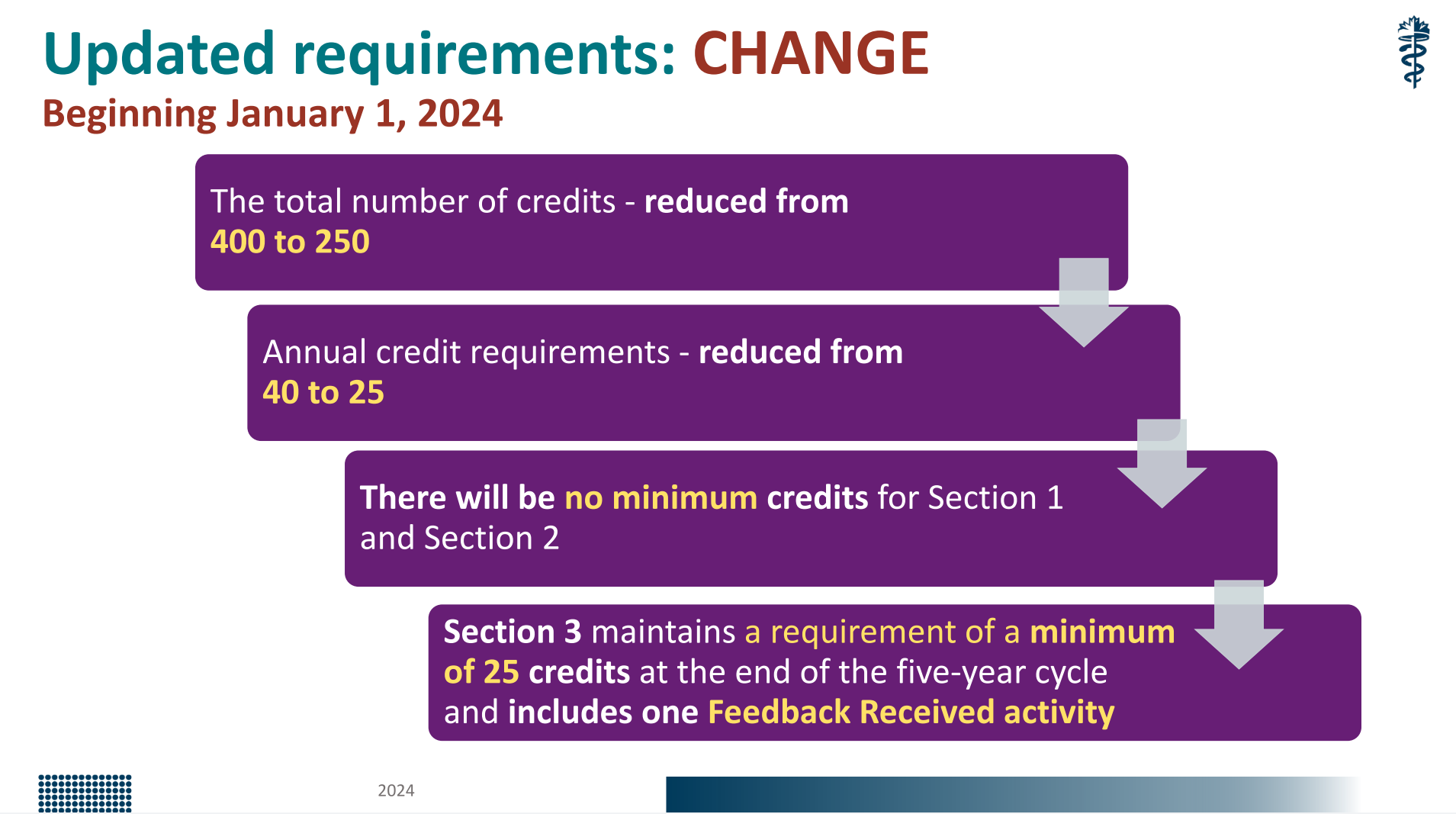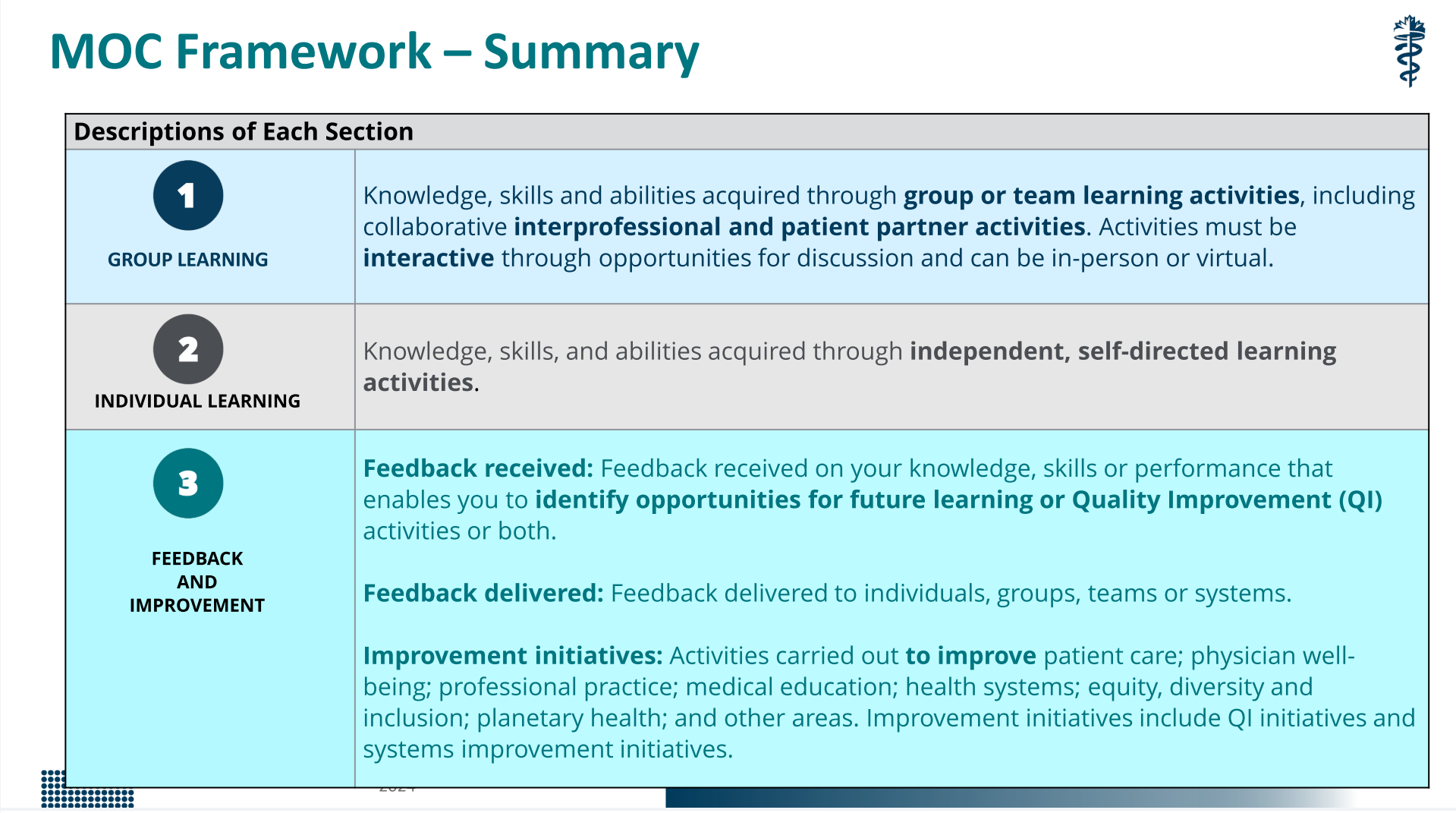After several rounds of member and participant feedback, the Royal College of Physicians and Surgeons of Canada will be implementing changes to its Maintenance of Certification (MOC) Framework.
There were three main reasons to refresh the MOC Framework: to modernize the framework, to focus more on Quality Improvement work, and to support the wellness of physicians and participants.
With these factors in mind, the Royal College released updated requirements that are retroactive to January 1, 2024:
- The total number of credits has been reduced from 400 to 250
- The number of annual credits required has been reduced from 40 to 25
- The minimum number of credits for Section 1 and Section 2 activities has been removed
- Section 3 requires a minimum of 25 credits at the end of the five-year cycle and includes one Feedback Received activity
The other facet of the refreshed MOC Framework is the updated descriptions of each section and addition of several new eligible activities. The descriptions have been tailored to reflect a modernized approach to learning and the new activities added.
Section 1: Group Learning
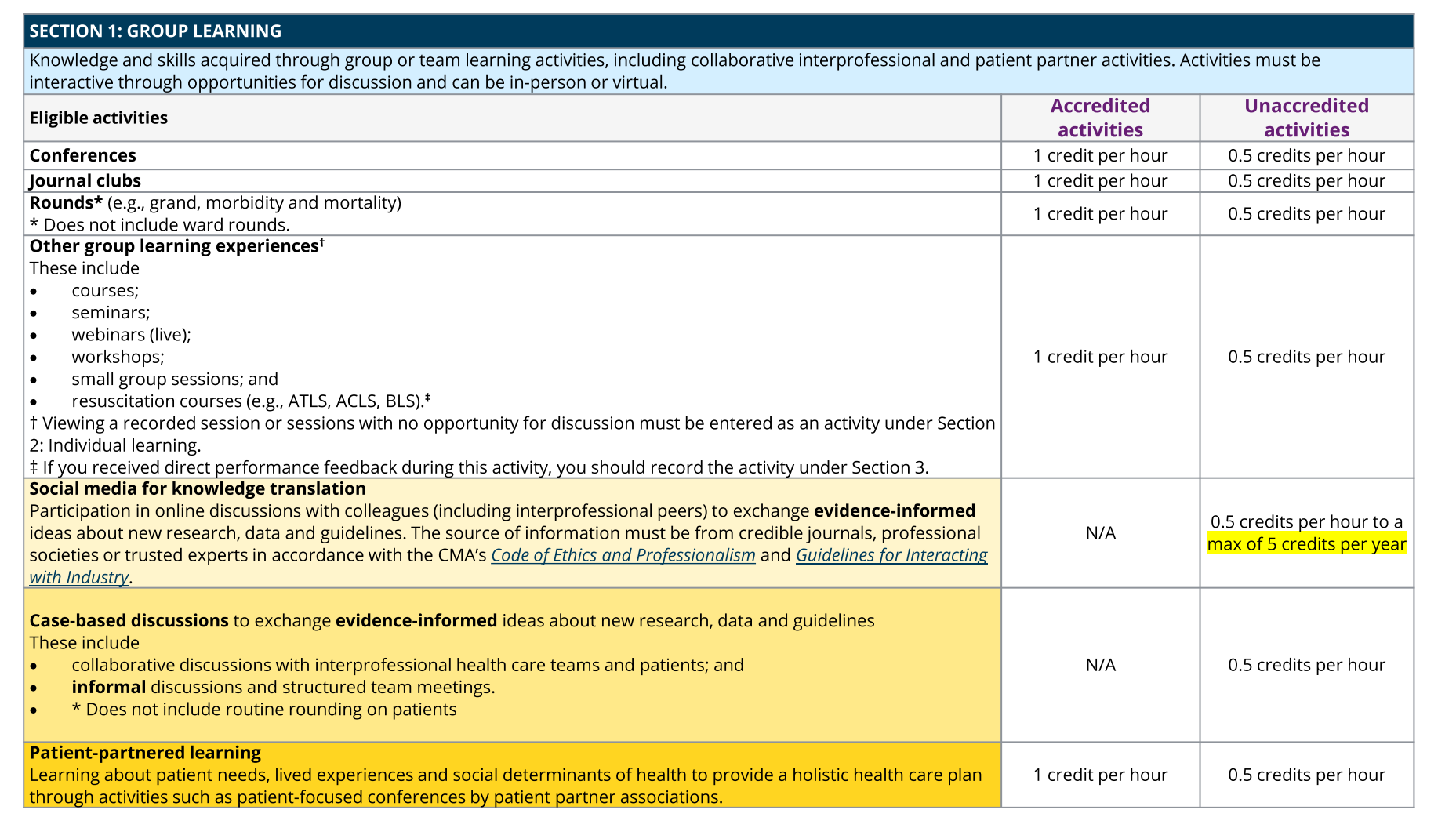
Knowledge and skills acquired through group or team learning activities, including collaborative interprofessional and patient partner activities. Activities must be interactive through opportunities for discussion and can be in-person or virtual.
New eligible activities
- Social media for knowledge translation: Participation in online discussions with colleagues (including interprofessional peers) to exchange evidence-informed ideas about new research, data, and guidelines. The source of information must be from credible journals, professional societies, or trusted experts in accordance with the CMA’s Code of Ethics and Professionalism and Guidelines for Interacting with Industry.
- 5 credits/hour up to maximum 5 credits/year
- Case-based discussions to exchange evidence-informed ideas about new research, data, and guidelines:
- Collaborative discussions with interprofessional healthcare teams and patients
- Informal discussions and structured team meetings
- Does not include routine rounding on patients
- 5 credits/hour
- Patient-partnered learning: Learning about patient needs, lived experiences and social determinants of health to provide a holistic health care plan through activities such as patient-focused conferences by patient partner associations.
- Accredited activities: 1 credit/hour
- Unaccredited activities: 0.5 credits/hour
Section 2: Individual Learning
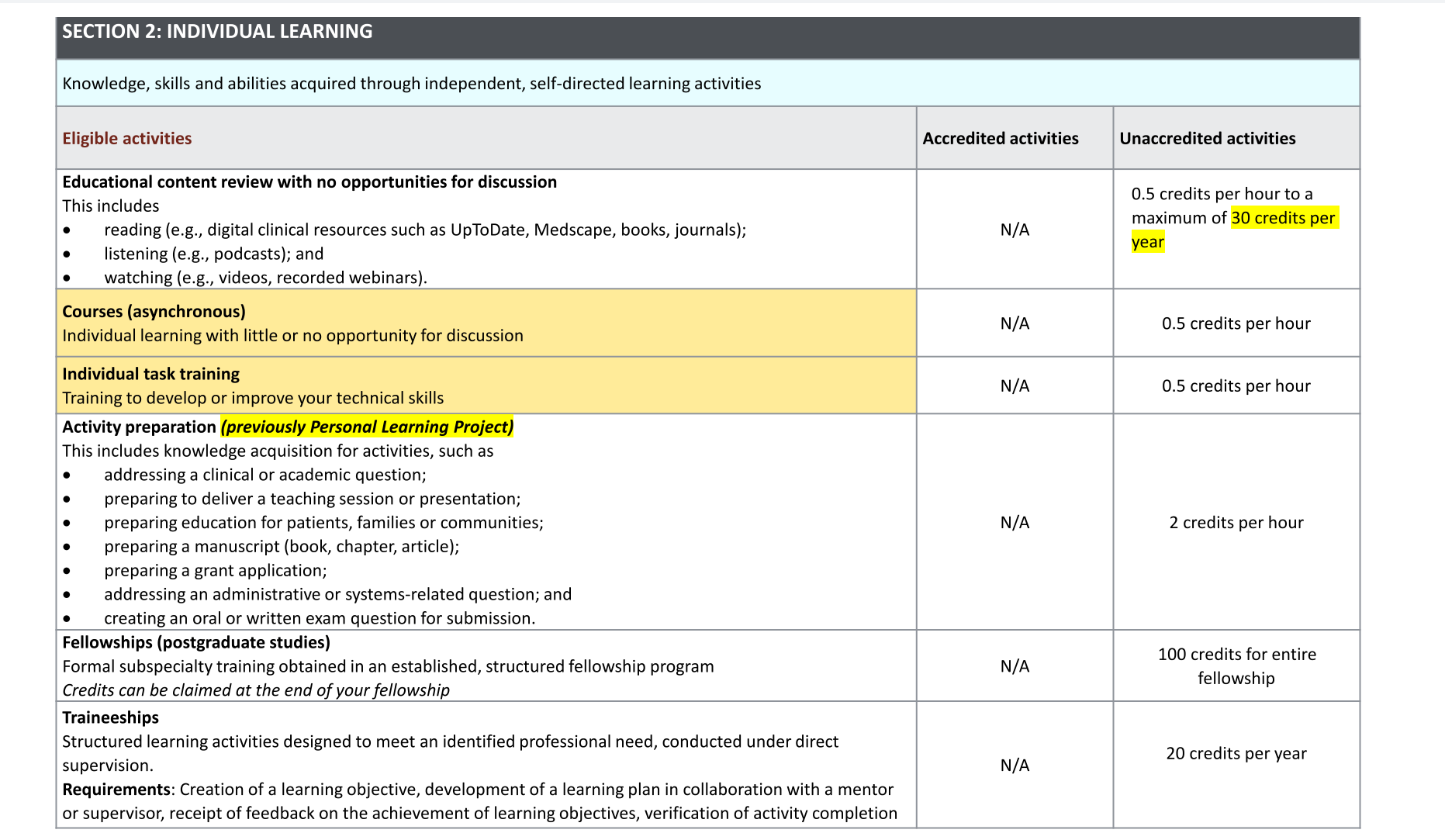
Knowledge, skills, and abilities acquired through independent, self-directed learning activities.
New eligible activities
- Asynchronous courses: individual learning with little or no opportunity for discussion
- 5 credits/hour
- Individual task training: training to develop or improve your technical skills
- 5 credits/hour
- Activity preparation (formerly Personal Learning Project): Knowledge acquisition for activities.
- addressing a clinical or academic question;
- preparing to deliver a teaching session or presentation;
- preparing education for patients, families or communities;
- preparing a manuscript (book, chapter, article);
- preparing a grant application; and more
- 2 credits/hour
Section 3: Feedback and Improvement
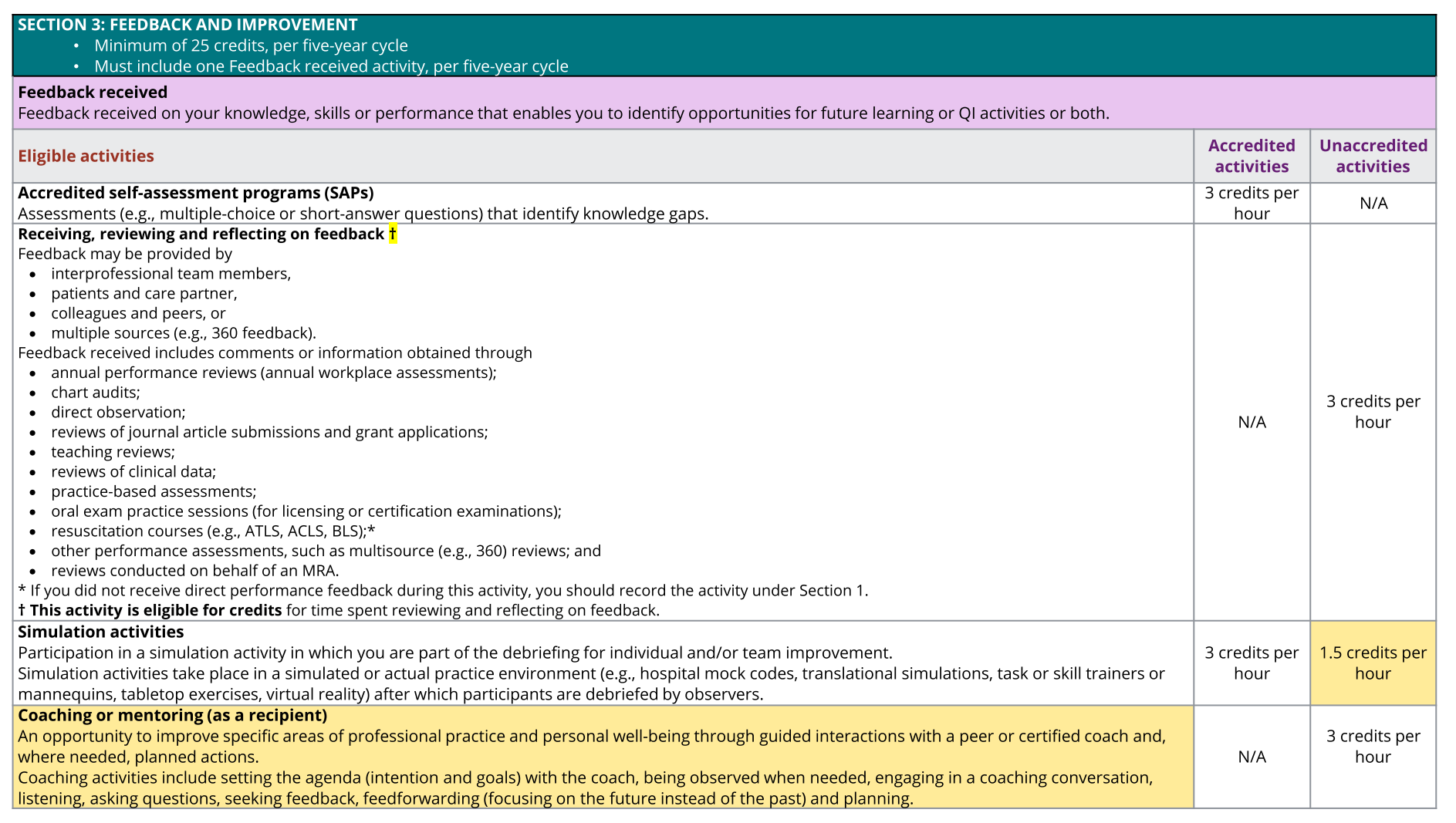
Feedback received: Feedback received on your knowledge, skills or performance that enables you to identify opportunities for future learning or Quality Improvement (QI) activities or both.
Feedback delivered: Feedback delivered to individuals, groups, teams, or systems.
Improvement initiatives: Activities carried out to improve patient care; physician well-being; professional practice; medical education; health systems; equity, diversity and inclusion; planetary health; and other areas. Improvement initiatives include QI initiatives and systems improvement initiatives.
New eligible feedback activities
- Simulation activities: participation in a simulation activity in which you are part of the debriefing for individual and/or team improvement.
- Accredited activities: 3 credits/hour
- Unaccredited activities: now 1.5 credits/hour
- Coaching or mentoring (as a recipient): An opportunity to improve specific areas of professional practice and personal well-being through guided interactions with a peer or certified coach and, where needed, planned actions. Coaching activities include setting the agenda (intention and goals) with the coach, being observed when needed, engaging in a coaching conversation, listening, asking questions, seeking feedback, feedforwarding (focusing on the future instead of the past) and planning.
- 3 credits/hour
- Review of feedback delivered: Feedback delivered which includes comments or information shared through
- annual performance reviews (annual workplace assessments);
- chart audits;
- direct observation;
- reviews of journal article submissions and grant applications;
- teaching reviews;
- reviews of clinical data;
- practice-based assessments; and more
- 3 credits/hour to maximum 15 credits/year
- Coaching or mentoring (as a provider): An opportunity for peer or certified coaches to get feedback, reflect and improve their skills as needed. This activity may involve asking for feedback (oral or written) on coaching or mentorship skills and reflecting or changing as needed for further interactions.
- 3 credits/hour to maximum 15 credits/year
New eligible improvement initiatives
- Quality improvement (QI) is an action-oriented, problem-solving framework that can help you enhance your practice and your personal or professional development.
- Individual improvement: Self-directed improvement activities
- 25 credits per QI initiative/year
- Group member of a QI activity
- 15 credits per QI initiative/year
- Leading role for a group QI activity
- 35 credits per QI initiative/year
- Systems improvement
- Adverse event investigation, reporting, and analysis: investigating an adverse event and recommending improvements. This can include clinical care review.
- 5 credits per initiative
- Adverse event investigation, reporting, and analysis: investigating an adverse event and recommending improvements. This can include clinical care review.
- Individual improvement: Self-directed improvement activities

